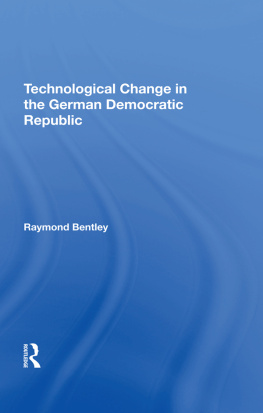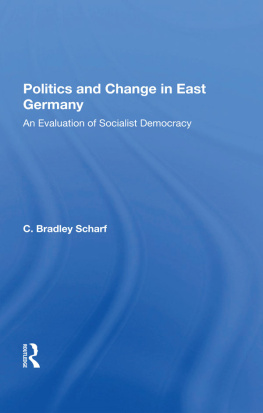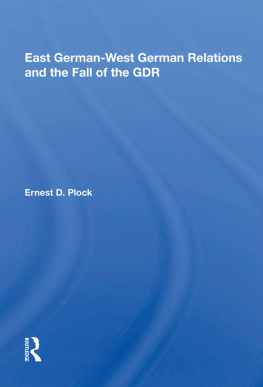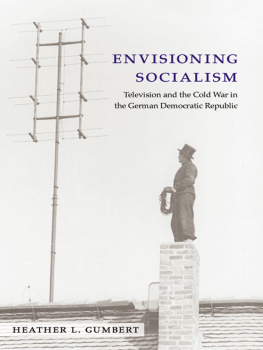Research and Technology in the Former German Democratic Republic
Research and Technology in the Former German Democratic Republic
Raymond Bentley
First published 1992 by Westview Press, Inc.
Published 2019 by Routledge
52 Vanderbilt Avenue, New York, NY 10017
2 Park Square, Milton Park, Abingdon, Oxon OX14 4RN
Routledge is an imprint of the Taylor & Francis Group, an informa business
Copyright 1992 Taylor & Francis
All rights reserved. No part of this book may be reprinted or reproduced or utilised in any form or by any electronic, mechanical, or other means, now known or hereafter invented, including photocopying and recording, or in any information storage or retrieval system, without permission in writing from the publishers.
Notice:
Product or corporate names may be trademarks or registered trademarks, and are used only for identification and explanation without intent to infringe.
Library of Congress Cataloging-in-Publication Data
Bentley, Raymond.
Research and technology in the former German Democratic Republic /
Raymond Bentley.
p. cm.
Includes bibliographical references and index.
ISBN 0-8133-8400-1
1. ResearchGermany (East). 2. TechnologyGermany (East).
1. Title.
Q180.G42B46 1992
338.943106dc20 91-23825
CIP
ISBN 13: 978-0-367-28573-9 (hbk)
Contents
by Christopher Freeman
Guide
The events in Eastern Europe in the last few years have been among the most dramatic this century. The collapse of the Berlin Wall in particular symbolised the transformation which has taken place. But the early euphoria which accompanied these events has given way to a more sober and considered appraisal. In Germany particularly the difficulties and the costs of re-integrating the former GDR within the German Federal Republic have proved far greater than was often assumed at the time. Yet the GDR has been relatively fortunate among the Eastern countries in the scale of investment support which has been available.
It is now increasingly clear that the East European economies confront a fairly prolonged period of structural adjustment and social turmoil. For the OECD countries to play a constructive role in promoting their recovery it is essential to understand the full complexity of the institutional changes which are involved.
The East European countries are fortunate in having relatively high standards of education and a fairly skilled workforce. This is probably their most important single asset in the recovery process. But there will have to be massive redeployment of this workforce and, at least temporarily, high levels of unemployment. East European enterprises will have to compete in a world market characterised by intensive technological competition. If they are to succeed in this they will have to make products and use processes and systems which meet the requirements of this competition.
This means that the organisation of technical change, i.e. the capacity to introduce and improve new processes and products, will be one of the most pressing needs of enterprises in Eastern Europe in the 1990s. In addition to making large investments in education, most of the former Communist countries did actually invest fairly heavily in R&D and related technological activities. But this investment suffered from great distortions, such as the huge military projects in the old USSR, and the tendency to neglect the enterprise-level scientific and technical activities. Therefore the re-orientation and re-deployment of the science/technology resources of the former Communist countries is one of the most urgent problems which they confront.
Raymond Bentley is one of the very few people in Western Europe who has studied these problems in depth both before and after the collapse of the Berlin Wall. I welcome this book most warmly as a unique and invaluable contribution to our understanding of events in Germany, and more widely in Eastern Europe.
Christopher Freeman
Emeritus Professor of Science Policy at
the University of Sussex and Visiting
Professor at the Maastricht Economic
Research Institute on Innovation and
Technology, University of Limburg
Several persons and institutions assisted me in obtaining much useful information and unpublished material for this study. In the former GDR, I am particularly grateful to Professor Jrg Roesler of the former Institut fr Wirtschaftsgeschichte in the GDR Academy of Sciences who helped me make useful contacts in East Berlin. I would also like to thank Dr. Martin Dube, State Secretary for Economics in the Modrow government; Professor Werner Meske of the former Institut fr Theorie, Geschichte und Organisation der Wissenschaft in the Academy of Sciences; and workers at the Ministry for Economics, the Office for Statistics and the Ministry for Science and Technology.
In the FRG, I am grateful to Frau Helga Echterhoff-Severitt and Herr Joachim Wudkte of the SV-Gemeinntzige Gesellschaft fr Wissenschaftsstatistik, Essen; Dr. Rainer Osterwalder of the European Patent Office and Dr. Joachim Dziewior, patent lawyer in Ulm. I also wish to thank workers at the Science Council in Cologne; the Federal Office for Statistics, Wiesbaden; the Federal Ministry for Research and Technology, Bonn; the Federal Ministry for Education and Science, Bonn; the German Patent Office in Munich; the Treuhandanstalt in Berlin; the Association of Industrial Research Associations in Cologne; the Institut fr Systemtechnik und Innovationsforschung in Karlsruhe and the Institut fr Gesellschaft und Wissenschaft in Erlangen. Thanks are also due to the librarians of the Staatsbibliothek Berlin, the Fachhochschule Ulm and the Universitt Ulm.
In France, I would like to thank the Directorate for Science, Technology and Industry of the Organisation for Economic Cooperation and Development (OECD) for kindly supplying some unpublished research and development statistics.
I am very grateful to a number of colleagues for commenting on all or part of the manuscript. These are John Naylor, Claire Booker, Robert Lee, Nigel Swain, Bernard Lisewski, Michael Buckle, Peter McMylor, Max Riederle, Albert Lutz, Wolfgang Schroer, Siegward Backes and Eberhard Simsch, I also wish to thank Angela Jacobs for help in formatting the tables and Amos Zubrow of Westview Press for his efficient and agreeable collaboration in the preparation of this book.
Part of the project was conducted under the auspices of "Forschung im Hauptamt" and I am grateful to the Ministry of Science and Arts of Baden-Wrttemberg for granting me this possibility. "Forschung im Hauptamt" in Baden-Wrttemberg aims at encouraging selected research projects in Fachhochschulen by permitting four lecturing sessions per week to be devoted to research for a limited period.
Finally, I wish to emphasise that the persons and institutions mentioned above do not necessarily concur with the analysis and conclusions contained in this study. The contents and any errors are entirely my responsibility.
Raymond Bentley
1
Introduction
The German Democratic Republic (GDR) was founded on 7 October 1949 and went out of existence on 3 October 1990. Its life as the "first socialist state on German soil" spanned almost exactly forty-one years. Born of the cold war and brought up in an environment of Stalinism, "everlasting friendship with the Soviet Union" and isolation from the West, the GDR matured into a small, secretive, drab industrial state officially seeking to "master the scientific-technological revolution" yet better known to the outside world for achievements in sport and spying than in science and technology.










